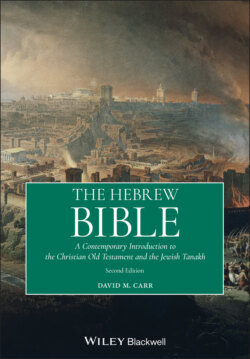Читать книгу The Hebrew Bible - David M. Carr - Страница 24
Bible Abbreviations, Chapters, and Verses
ОглавлениеWhen books and articles cite biblical passages by chapter and verse, they usually follow this order: abbreviation for the biblical book, followed by the chapter number, followed by the verse. An example is Isa 44:28 (chapter 44, verse 28). If more than one verse is cited, dashes and commas can be used: Isa 44:20, 28 or Isa 44:10–13, 28. When scholars want to refer to the bulk of a passage without detailing specific verses left out, they will add an asterisk to indicate that some verses are not meant to be included in the reference, e.g. Genesis 28*. Occasionally, you will also see scholars refer to half‐verses, e.g. 2:4a or 2:4b, following accent divisions found in their Hebrew Bibles. Such notations will be sparingly used in this book only to label citations that begin or end in a half‐verse.
Here are some standard abbreviations for biblical books shared by Jewish and Christian Bibles (given in the order followed by most Christian Bibles). Sometimes these are further shortened through just giving the first two letters (e.g. Ex instead of Exod) or removing a vowel (e.g. Jdg for Judges):
Gen = Genesis
Exod = Exodus
Lev = Leviticus
Num = Numbers
Deut = Deuteronomy
Josh = Joshua
Judg = Judges
Ruth = Ruth
Sam = Samuel
Kgs = Kings
Chr = Chronicles
Ezra = Ezra
Neh = Nehemiah
Esth = Esther
Job = Job
Ps or Pss (for plural) = Psalms
Prov = Proverbs
Eccl (or Qoh) = Ecclesiastes (Hebrew Qohelet)
Song (or Cant) = Song of Songs (Canticles)
Isa = Isaiah
Jer = Jeremiah
Lam = Lamentations
Ezek = Ezekiel
Dan = Daniel
Hos = Hosea
Joel = Joel
Amos = Amos
Ob = Obadiah
Jon = Jonah
Mic = Micah
Nah = Nahum
Hab = Habakkuk
Zeph = Zephaniah
Hag = Haggai
Zech = Zechariah
